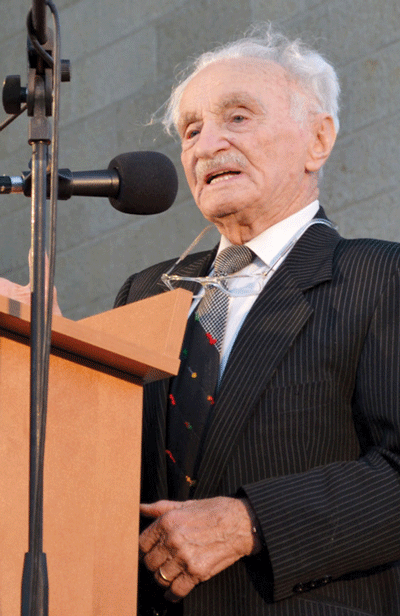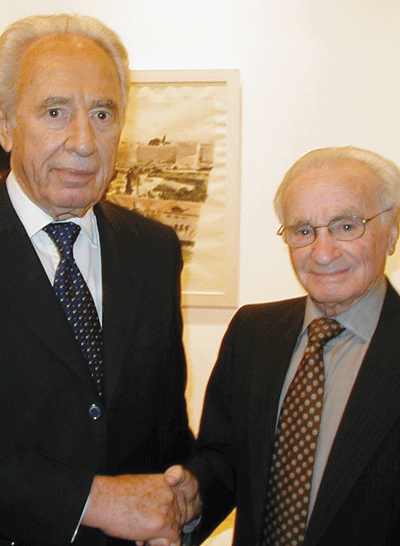By MORDECAI SPECKTOR
Rabbi Marc Liebhaber began writing a column in the American Jewish World around 40 years ago. The popular feature was titled “From Friday to Friday,” and topics ranged from communal Jewish issues — local, national and global — to Israel.
The Jewish state was a frequent topic. Rabbi Liebhaber often reported on his travels to Israel, and relayed his concerns about social and political developments there.
Remembrance
In March 1980, Liebhaber, who had served in the pulpit of Tifereth B’nai Jacob Synagogue, in north Minneapolis, realized a longtime dream when he purchased the newspaper from Norman Gold and his partners. He ran the Jewish World — and continued to write his column — for 26 years, until he sold the paper to Minnesota Jewish Media, LLC, the current parent company of the AJW.
On Oct. 14, Rabbi Liebhaber died at his home in Boca Raton, Fla. He was 97. Funeral services took place this week in New York City.

A native of Markushev, Poland, Liebhaber was “a survivor of the war against the Jewish people,” as the AJW reported in 1980.
His father, Pinchas, and mother, Shaindel, perished in the Holocaust. Also, the rabbi’s sister, Hinda, and her husband and son were murdered.
“She and her son died in Treblinka, and her husband was killed when he fled to Russia,” the rabbi’s daughter, Sharon Liebhaber, of Wynnewood, Pa., told the AJW this week.
Rabbi Liebhaber “almost never” spoke about his personal experience of the Shoah, said Sharon. “He would never agree to be formally interviewed — not by me, not by the kids, not by any of these organizations. It just was very difficult for him.”
Sharon added that her father came from “a very large extended family that was very close. His father was one of 11 children, his mother was one of five, all of whom were married with children and grandchildren; and only one uncle and a few cousins survived. So, really everybody was murdered.”
In a column many years ago (there is no index for the archive volumes of the AJW, going back to 1915), Rabbi Liebhaber told of a return to his hometown after the end of World War II. A gentile family had moved into his family’s home. He was allowed to stay the night, to sleep on the kitchen floor; but he fled during the night, in fear that the townfolk might murder him.
Sharon Liebhaber confirmed that story: “Jews throughout Europe came back to their towns and so he did, too, looking for family.” Her father returned to Markushev and found that a young family, former neighbors, was living in the family home. “All his mother’s things were there; but they had clearly just moved in and taken possession.”
“Actually, Jews in his town and in the neighboring town were killed by the gentiles when they came back,” she added, regarding anti-Jewish pogroms in Poland, after the war had ended.
Prior to the war, Rabbi Liebhaber studied in the renowned Tahkemoni Rabbinical Seminary in Warsaw, and received his rabbinic ordination. “He also got a journalism degree from the University of Warsaw,” said Sharon. “He always wanted to work as a Yiddish journalist.”
She said that he published a book of Yiddish poetry, in 1938, and “a book of his sermons, in Polish. He was fluent in Polish, as well as in Yiddish and Hebrew.”
After the war, Liebhaber came to Munich, in the American Zone of Occupation. He applied for a visa to the United States — this was before the birth of Israel.
“And while he was in Germany, he met my mother and they got married; and he worked as an editor and columnist on different Yiddish newspapers… And he also got his doctorate; he wrote his thesis on the history of the Jewish press in Germany,” his daughter recounted.
Rabbi Liebhaber, and his wife, Henia, who graduated from medical school in Germany, emigrated to North America and lived in Calgary, Canada, from 1950 to 1952. Henia worked at Holy Cross Hospital, and Rabbi Liebhaber was the headmaster of the Jewish day school, according to Sharon.
In 1952, Rabbi Liebhaber got a job teaching at the Talmud Torah of Minneapolis. His wife studied at the University of Minnesota medical school, specializing in pediatric medicine, and worked at the Anoka state hospital. Dr. Henia Liebhaber died in 2010.
Rabbi Avraham Ettedgui, a former principal of the Talmud Torah and now the spiritual leader of Sharei Chesed Congregation in Minnetonka, told the AJW that, shortly after arriving in Minneapolis, “the Liebhabers decided to hold regular services in their home, and they began to attract many people. As the group grew in size, they decided to purchase a house on Ottawa Avenue in St. Louis Park where they continued to conduct services in that location and later at the site of the B’nai Abraham synagogue,” which became Bnai Emet Synagogue.
The AJW’s 75th anniversary special publication, in 1976, reported that two Minneapolis area congregations, Mikro Kodesh and Tifereth B’nai Jacob merged: “They had a facility in Golden Valley, on the edge of Minneapolis city limits. The congregation became Mikro Tifereth and was led by Liebhaber and Cantor Shalom Markovits.”
It should also be mentioned that Rabbi Liebhaber started buying real estate soon after arriving to teach at the Talmud Torah. In 1966, he joined a partnership, with four other local Jewish businessmen, which began purchasing nursing homes. The group eventually operated 19 nursing homes. The AJW offices, for around 30 years, until 2013, were in a building on Minnetonka Boulevard in St. Louis Park, which was owned by Rabbi Liebhaber and Mark Mandel. The upper level of the building housed the offices of Aviv Health Care, which operated the nursing homes. In 2013, Aviv was purchased by a Chicago-based firm, Villa Health Care.
Success in business enabled Rabbi Liebhaber to become a philanthropist, to the benefit of numerous Jewish organizations. In his eulogy for Rabbi Liebhaber (on Page 4 of the Oct. 24 edition), Prof. David Golinkin writes: “Rabbi Liebhaber was a ba’al tzedaka, a Jew who gave very generously to many Jewish organizations, including B’nai Torah Congregation, in Boca Raton; Masorti Olami/World Council of Conservative Synagogues; and the Schechter Institute.
Rabbi Liebhaber and his wife also created the Liebhaber Family Yom Hamoreh Endowment Fund at the Talmud Torah of Minneapolis, according to Rabbi Ettedgui. He said the fund honors “Talmud Torah teachers who had reached certain milestones in their teaching careers and who excelled in the work they performed. In addition, an honored teacher was also given a substantial gift, such as a trip to Israel, where they could further their education and their experience as a teacher.”
Ettedgui also mentioned that Rabbi Liebhaber served as president of the World Council of Conservative Synagogues.

Following the 1995 assassination of Israeli Prime Minister Yitzchak Rabin, the rabbi and his wife established the Liebhaber Prize for the Promotion of Religious Tolerance in Israel. The prize, under the auspices of the Schechter Institute of Jewish Studies, has been awarded on a yearly basis, over the past 18 years, to educators, scholars and artists working to build tolerance and pluralism in the Jewish state.
In 2014, the Liebhaber Prize, with a $40,000 stipend, was shared by musician Ehud Banai, and author and philosopher Dr. Micah Goodman. The awards ceremony, on June 14, on the Schechter Institute’s Jerusalem campus, was part of a “Spring of Tolerance” campaign that included a series of cultural events in Israel and an advertising campaign promoting tolerance.
I attended the 2013 Liebhaber Prize awards ceremony in Jerusalem, as the guest of the rabbi. Prior to the event at the Schechter Institute, Rabbi Liebhaber took me to dinner at a fish restaurant that he knew. He directed the taxicab driver to its out-of-the-way location in west Jerusalem.
Since selling the newspaper in 2006, Rabbi Liebhaber had consistently lauded the direction of the AJW, under my direction and the new local ownership group. He was a fan, and remained concerned that the newspaper would thrive.
Long before he bought the Jewish World, in 1980, he had cherished the idea of owning a Jewish newspaper, according to Bob Krishef, whom the rabbi hired as his first managing editor.
“It was a dream come true for him,” Krishef said this week.
Marshall Hoffman, AJW managing editor from 1988 to 2000, who hired me as the staff writer in 1995, recalled, “It was obvious that Rabbi Marc Liebhaber wasn’t born and raised in Minnesota. He did not mind confrontation. In fact, he often welcomed it.”
Hoffman recalled that the rabbi used his “From Friday to Friday” column “to publicly criticize policies of Jewish institutions, Jewish federations, synagogues, Jewish movements of all streams, the Israeli government, and anything else on his accomplished mind.”
It was not just for the sake of being a “troublemaker,” Hoffman said. “The rabbi was very much into debates of ideas and issues, and he used his often controversial column to foster such debates, to engage his readers in a deeper level of thinking. It was, to put it mildly, a thankless job…. He spoke his mind, invited feedback and opposing views, and let the community debate an issue in the ongoing effort to change the Jewish world for the better. As such, his impact on our community was profound yet seldom recognized. His unique voice will be greatly missed.”
“He had a long life, it was a good life; it had its sorrows: the Holocaust, my mother’s illness, my brother’s murder,” commented Sharon Liebhaber. “But there’s no life without its sorrows. As a rabbi, he knew that.”
In 1992, Howard Liebhaber, the Liebhabers’ son, was murdered in Minneapolis. Not long after that, the Liebhabers moved to Florida.
In recent years, Rabbi Liebhaber attended Congregation B’nai Torah, in Boca Raton.
“He had this beautiful sensitivity to my work as a rabbi, he treated me with extraordinary respect and dignity, and I always appreciated that,” Rabbi David Steinhardt, senior rabbi of B’nai Torah, told the Jewish World.
Rabbi Liebhaber was “a very good friend,” said Steinhardt, who added that “people fell in love” with the diminutive elderly rabbi. “It was really beautiful to see how he interacted with congregants here. He brought this wealth of experience and knowledge to every situation, and yet he was open to everybody in a very beautiful way. He had a lot of friends here.”
Getting back to the joys and sorrows of Rabbi Liebhaber’s long life, his daughter commented at the end of a telephone conversation:
“He used to say, ‘God has some complaints against me’ — he said it in Yiddish — ‘but I have many against God, and we’ll have an interesting conversation when we meet.’”
Rabbi Liebhaber also is survived by a son, Paul, who lives in Ashdod, Israel, two grandchildren, and two great-grandchildren.
The American Jewish World sends its condolences to the Liebhaber family.
(American Jewish World, 10.24.14)




















Just wanted to add that Rabbi Leibhaber was also a teacher at the St. Paul Talmud Torah in the high school division…. I remember his quick wit and all the laughs we had in his class…. I also remember (though hate to admit) him telling me and a friend that if what we were talking about was so much more interesting than what he was saying, we could discuss it in the hall….. we spent many a day out in the hall!